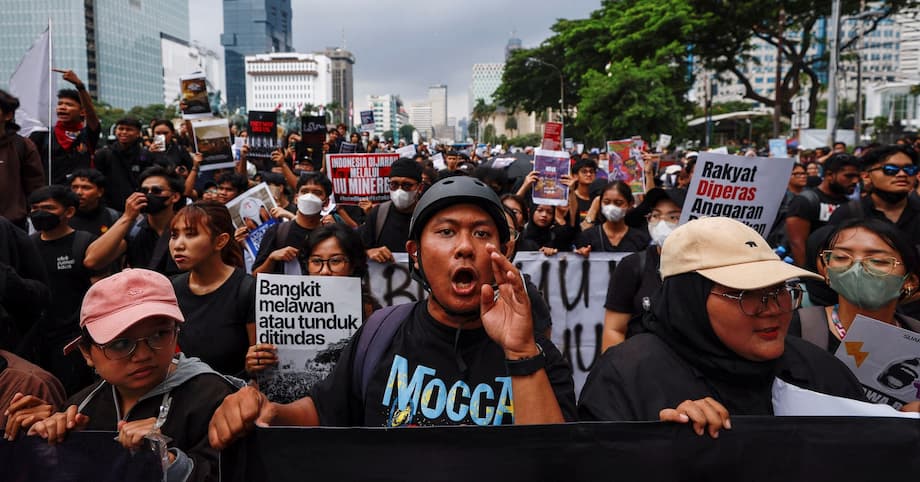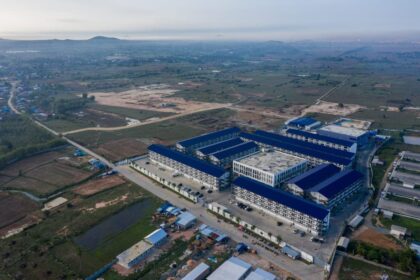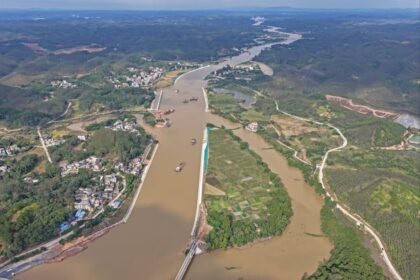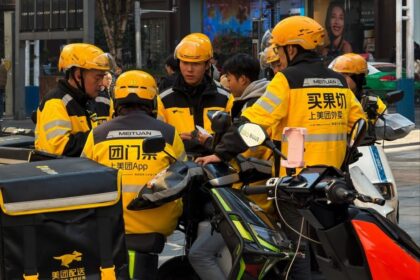What started the protests
Indonesia has been gripped by its largest street unrest in years after anger over lawmakers perks collided with a hard security response and a widely seen fatal incident. A 21 year old motorcycle taxi driver, Affan Kurniawan, died on Aug 28 after an armored police vehicle ran over him near crowds in Jakarta. Rights groups report at least eight to eleven deaths since protests began on Aug 25, with hundreds to more than one thousand injured, and thousands detained. Human Rights Watch estimates more than 3,000 detentions nationwide since late August. The demonstrations, which spread beyond Jakarta within days, channel frustration over lavish benefits for lawmakers during a period of rising living costs and weak wage growth.
- What started the protests
- A widening online crackdown
- What the law allows and why critics are alarmed
- Force on the streets
- Disinformation, surveillance and platform pressure
- Economic and political roots of anger
- Due process and fairness in arrests
- What officials say
- What rights groups propose
- The Bottom Line
Video of the vehicle incident rocketed across social media and helped propel rallies in nearly fifty cities, according to rights monitors. Students, labor unions, and civil society organizations gathered outside parliament buildings and city centers. Police used water cannon and tear gas to disperse crowds. President Prabowo Subianto rolled back some perks for lawmakers and appealed for calm. He also warned against looting and labeled some violence as treason and terrorism. The government deployed soldiers to guard sensitive sites in Jakarta, and media reported snipers positioned at key locations and checkpoints across the capital.
Despite tension, students continued to gather in cities such as Yogyakarta, Bandung, and Makassar. In several regions, crowds ransacked or set fire to local government buildings after clashes. Financial markets slipped in early trading before regaining some ground. Platforms that had been central to organizing faced added constraints. TikTok suspended its live feature in Indonesia during the unrest. At the same time, police began arresting social media users they accused of incitement.
A widening online crackdown
Police say they have detained more than forty people as they search for alleged provocateurs behind riots in Jakarta and other regions. At least eleven were held over social media posts that authorities say incited protests or violence. Among those arrested was Laras Faizati Khairunninsa, a communications officer at an organization linked to the ASEAN secretariat in Jakarta. The National Police criminal investigation department, known as Bareskrim, accused her of inciting hatred against individuals and groups and of urging mass action through posts and videos.
At a press conference, the head of the police cybercrime directorate displayed screenshots that he said came from Laras Instagram account. One image placed her near National Police headquarters, a location officials described as a vital national site. The director alleged that the post encouraged people to burn the building and to attack those inside. Police say the content was uploaded from a location close to police headquarters, which they argue posed a threat to the institution.
In the same week, Jakarta Police apprehended six people who they say encouraged underage students to carry out anarchic actions during protests on Aug 25 and Aug 28 through their social media accounts. Those detained include human rights figures Delpedro Marhaen and Muzaffar Salim from the Lokataru Foundation and Syahdan Husein from the online movement Gejayan Memanggil, which has helped organize student actions in Yogyakarta. The Jakarta Legal Aid Institute reported that it lost access to its TikTok account, which the platform marked as permanently banned after the group posted a solidarity message urging people to stay safe.
What the law allows and why critics are alarmed
Police cite a mix of criminal law and the Electronic Information and Transactions Law to justify these arrests. The ITE Law, first passed in 2008 and amended several times, regulates online speech. It has been used for cases involving hate speech, defamation, and incitement. Critics argue that vague terms and broad interpretations make the law prone to use against peaceful expression. Indonesia is a party to the International Covenant on Civil and Political Rights, which protects speech and assembly while allowing narrow limits for direct incitement to violence. Courts must weigh intent, likelihood, and direct links to harm. A recent Constitutional Court ruling narrowed use of some ITE defamation clauses, but people continue to face charges for critical posts.
ITE law and criminal procedure at a glance
Legal experts and civil society groups also point to ongoing revisions to Indonesia criminal procedure rules and police and military laws that expand state powers. A monitoring report by the CIVICUS alliance described planned changes that increase surveillance capacity, including wiretapping arrangements between the Attorney General Office and telecom operators without strong safeguards. It also flagged a revision of the military law, which expands the military role in civilian institutions. Advocates say such steps, when combined with aggressive use of the ITE Law, raise the risk that online activism will be treated as a security threat rather than civic participation.
Digital rights groups say the recent arrests fit a pattern. Human rights defenders and journalists have faced harassment, doxxing, and digital attacks. Press freedom groups say Indonesia ranking fell in 2025. The convergence of legal pressure, surveillance, and fast moving police investigations has added to a sense that any critical post could draw a knock on the door.
Force on the streets
While the police say they are tracking instigators online, the most visible state response has been on the streets. Witnesses and rights groups describe widespread use of tear gas and rubber bullets in several cities to disperse crowds. In Jakarta, a motorcycle taxi driver was fatally run over by an armored police vehicle near a crowd on Aug 28. Seven officers are under investigation in that case. A student died in Yogyakarta after an alleged beating during clashes outside police headquarters. In other cities, public employees and a member of the civil service police unit died during arson and mob violence after clashes.
Amnesty International has called the police response excessive and urged a full accounting. The organization says crowd control weapons can quickly escalate risk when used without strict training and oversight. Montse Ferrer, Amnesty International Regional Research Director, urged authorities to launch an independent and impartial investigation into the deaths and the handling of protests.
“Nobody should die while exercising their right to freedom of expression and peaceful assembly. Authorities in Indonesia must promptly ensure an independent and impartial investigation into these deaths and violent incidents.”
Human Rights Watch has asked the government to end arbitrary detention of protesters and to align policing with United Nations guidance on the use of force and less lethal weapons. The group says the military should not be used for civilian law enforcement because soldiers are trained for combat and are more likely to use wrongful force in civilian settings.
Disinformation, surveillance and platform pressure
The unrest has played out in a digital environment already under strain. CIVICUS reported doxxing and cyberattacks against critics during earlier protests in 2025. During the latest wave, digital rights advocates cataloged disruptions to online access and restrictions on livestreams. TikTok suspended its live feature in Indonesia during the peak of unrest. Some activists say they saw their posts throttled or their accounts restricted after they shared protest information or footage of police actions. Authorities have at times suggested foreign interference without providing evidence, a claim rights groups view as an attempt to discredit local voices.
Indonesia agreement on wiretapping between the Attorney General Office and telecom operators without clear safeguards adds to fears of surveillance. Journalists and human rights groups describe a chilling effect as more people avoid posting satire, memes, or sharp criticism. Nenden Sekar Arum of the Southeast Asia Freedom of Expression Network warned that the trajectory is worrying because anyone could be targeted for what they write online.
Economic and political roots of anger
Public frustration extends beyond a single policy. Lawmakers agreed to a monthly housing allowance of around 50 million rupiah for each of 580 members of the House of Representatives, a figure far above the minimum wage in Jakarta. Protesters point to a larger gap between privilege for the political class and stagnant wages for many workers. Food prices have risen, and youth unemployment is high. Families describe an economy where many young people take gig work to make ends meet while lawmakers expand perks.
Anger over the perks merged with grievances over proposed tax increases and the cost of populist programs. A free school meal initiative was marred by reports of food poisoning. A movement known as Indonesia Gelap drew supporters with calls for integrity in public spending and for accountability in policing. The killing of Affan Kurniawan, the rideshare driver, became a rallying point because many sympathized with a young person forced into gig work to handle rising costs.
Student groups say the government concessions did not reflect their core demands. In Makassar, student union leader Syamry criticized the official response in remarks to reporters.
“The President statement yesterday did not accommodate demands from students and civil society.”
Due process and fairness in arrests
Rights advocates question how quickly online critics were named as suspects. Dimas Bagus Arya of the Commission for Missing Persons and Victims of Violence questioned whether police followed preliminary steps such as summoning people as witnesses before designating them suspects. Legal experts say that due process starts with witness questioning, then moves to suspect status only with probable cause supported by evidence. The speed of some arrests has raised concerns that investigators are prioritizing deterrence over procedure.
Julius Ibrani of the Indonesian Legal Aid Association called the arrests a form of criminalization of expression. Nenden Sekar Arum warned that the campaign appears to be a broad crackdown on anyone critical of the government on the internet. Both argue that fear will push people into self censorship, replacing critique with silence.
KontraS and allied organizations are petitioning for the release or at least the suspension of detention for those arrested. Lawyers are preparing pretrial challenges if suspects are not freed soon, a common path in Indonesia when families and counsel argue that procedures were not followed in naming someone a suspect.
What officials say
President Prabowo Subianto has tried to balance concessions with law and order. He announced a reduction in the controversial benefits but also instructed police and military to act firmly against rioters. After visiting injured officers, he promised promotions for dozens of police injured during the unrest. In a televised appearance he defended the force while acknowledging that some officers may have erred.
“There might be police members who were wrong, but do not forget dozens of officers who sacrificed themselves.”
The police cybercrime directorate says it is focusing on content that crosses a clear red line. Officials argue that posts encouraging people to attack a vital facility move beyond protected expression and into crime. International law does not protect direct incitement to violence. The debate centers on how clear, immediate, and likely the danger must be, and whether enforcement is consistent rather than selective.
What rights groups propose
Civil society leaders present a plan for de escalation that begins with truth and accountability. Amnesty International Indonesia director Usman Hamid called for a joint fact finding team that includes community leaders and experts to identify the people who instigated arson and destruction and to verify the role of security forces in violent incidents.
“This is why the police should be showing us the people who actually instigated the riots and damaged public facilities.”
Human Rights Watch urges the government to release peaceful protesters, end arbitrary detention, and investigate excessive force. CIVICUS asks the authorities to end online restrictions, stop doxxing and cyberattacks against critics, and update training for police in line with international standards. Rights lawyers also want clear timelines for investigations into deaths, including the case of Affan Kurniawan.
The Bottom Line
- Protests began on Aug 25 over lawmakers perks and economic pain and spread nationwide within days.
- Video of a police armored vehicle running over a 21 year old driver in Jakarta on Aug 28 fueled outrage.
- Rights groups report at least 8 to 11 deaths, hundreds to more than 1,000 injured, and more than 3,000 detentions.
- Police arrested more than 40 alleged provocateurs and at least 11 people for social media posts.
- High profile detainees include staff from the Lokataru Foundation and a coordinator from Gejayan Memanggil.
- Authorities used tear gas and rubber bullets and deployed soldiers and snipers in some areas.
- Amnesty International and Human Rights Watch call for independent investigations and restraint by security forces.
- Digital repression concerns include doxxing, cyberattacks, internet restrictions, and the suspension of TikTok live in Indonesia.
- Critics say the ITE Law and broader legal changes enable overreach and chill online expression.
- President Prabowo cut some perks but warned of a firm response to rioting and praised injured police.
- Rights groups urge a joint fact finding team and release of peaceful protesters, with due process for all cases.












